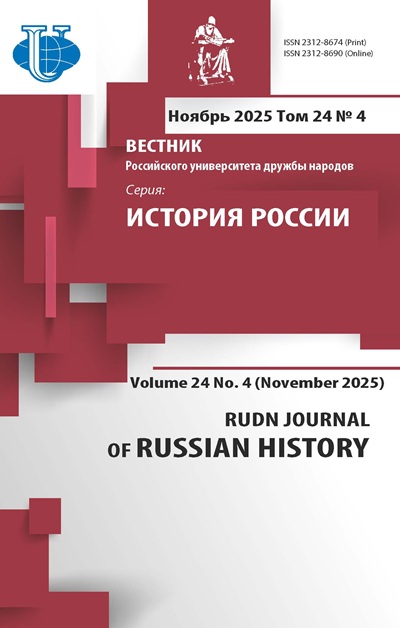СОБЫТИЯ 1917 ГОДА В ВОСПОМИНАНИЯХ ТВОРЧЕСКОЙ ИНТЕЛЛИГЕНЦИИ СЕРЕБРЯНОГО ВЕКА
- Авторы: Котеленец Е.А.1, Сергеева М.В.1
-
Учреждения:
- Российский университет дружбы народов
- Выпуск: Том 16, № 2 (2017)
- Страницы: 253-263
- Раздел: «ДРУГОЙ ВЗГЛЯД»: 1917 ГОД В ОЦЕНКАХ СОВРЕМЕННИКОВ
- URL: https://journals.rudn.ru/russian-history/article/view/16658
- DOI: https://doi.org/10.22363/2312-8674-2017-16-2-253-263
- ID: 16658
Цитировать
Полный текст
Аннотация
В статье анализируется отношение российской творческой интеллигенции к революционным событиям 1917 г. в России. Изучаются дневники и мемуары И. Бунина, Н. Бердяева, М. Горького, Ф. Степуна, З. Гиппиус и др. Рассматривается эволюция отношения интеллигенции к революции (от восторга до полного отрицания); изучаются причины, подтолкнувшие отдельных ее представителей к эмиграции.
Ключевые слова
Об авторах
Елена Анатольевна Котеленец
Российский университет дружбы народов
Email: kotelelena@yandex.ru
Мария Владимировна Сергеева
Российский университет дружбы народов
Список литературы
- Лукьянов С.С. Революция и власть // Смена Вех. Прага. 1921. Т. 2.
- Гаспаров М.Л. Интеллигенция и революция // Записи и выписки. М.: Новое литературное обозрение, 2012.
- ЛихачевД.С. О русской интеллигенции: письмо в редакцию // Новый мир. 1993. № 2. С. 3-9.
- Корелин А.П. Россия 1913 год. Статистико-документальный справочник. СПб.: Блиц, 1995.
- Гаспаров М.Л. Русская интеллигенция как отводок европейской культуры // Русская интеллигенция и западный интеллектуализм: История и типология. Международная конференция; май 1997, Неаполь. М.: О.Г.И., 1999. Вып. 2.
- Успенский Б. А. Русская интеллигенция как специфический феномен русской культуры // Русская интеллигенция и западный интеллектуализм: История и типология. Международная конференция. Май 1997, Неаполь. М.: О.Г.И., 1999. Вып. 2. С. 5-12.
- Гиппиус З.Н. Петербургский дневник. M.: Сов. писатель: Ред.-произв. агентство Олимп, 1991.
- Степун Ф.А. Бывшее и несбывшееся. В 2 т. Т. 1. Нью-Йорк: Изд-во им. Чехова 1956.
- Трубецкой С.Е. Минувшее. М.: ДЭМ, 1991.
- Воспоминания Н.М. Тарабукина. Рукопись. Собр. В. И. Костина, М., 1920.
- Бердяев Н.А. Самопознание (опыт философской автобиографии). М.: Международные отношения, 1990.
- Горький М. Несвоевременные мысли. М., Книга по требованию, 2016
- Репин И.Е. Письма к писателям, литературным деятелям. М., 1950.
- Сахарова Е.В. Василий Дмитриевич Поленов, Елена Дмитриевна Поленова. Хроника семьи художников. М., Искусство, 1964.
- Петров-Водкин К.С. Письма. Статьи. Выступления. Документы. М.: Советский художник. 1991.
- Бордюгов Г.А. Ожидаемая революция не придет никогда. Массовые протесты конца 2011 - начала 2012 года на фоне гражданского противостояния ХХ века. М.: АИРО-ХХ1, 2012.
- Шагал М.З. Моя жизнь. М.: Азбука, 2000.
- Розанов В.В. Апокалипсис нашего времени. М.: Эксмо, 2015.
- Ebert C. Sinaida Hippius: Seltsame Nahe. Berlin: OberbaumVerlag, 2004.
- Бунин И.А. Окаянные дни. Изд. 2-е. М.: Дарь, 2014.
- Воскресенская М.А. Русская революция в представлениях и оценках культурной элиты конца Х1Х - начала XX в. // Вестник Томского государственного университета. 2008. № 314. С. 75-82.
- Седлер А.А. Повседневность интеллигента: опыт выживания в период революционных трансформаций (начало 1920-х гг.) // Вестник Томского государственного университета. 2011. № 351. C. 105-108.
- Шлосберг Л.М. Совесть и целесообразность? // Радио Свобода. URL: http://www. svoboda.org/a/28141943.html. Дата обращения: 19.12.2016.
- Gaiton Marullo T Ivan Bunin: Russian Requiem, 1885-1920: A Portrait from Letters, Diaries, and Fiction, Chicago, 1993.
- Кознова Н.Н. Мемуарная проза русских писателей-эмигрантов: осмысление революционной стихии в России XX века // Преподаватель XXI век. М., Изд-во «Прометей» МПГУ, 2007. № 4. С. 110-116.
Дополнительные файлы















